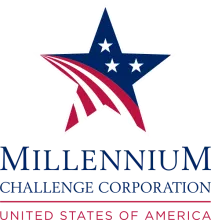Created by the U.S. Congress in January 2004 with strong bipartisan support, the Millennium Challenge Corporation (MCC) is changing the conversation on how best to deliver smart U.S. foreign assistance by focusing on good policies, country ownership, and results.
What is distinctive about MCC? MCC is a prime example of smart U.S. Government assistance in action, benefiting both developing countries and U.S. taxpayers through:
-
Competitive selection: Before a country can become eligible to receive assistance, MCC’s Board examines its performance on independent and transparent policy indicators and selects compact-eligible countries based on policy performance.
-
Country-led solutions: MCC requires selected countries to identify their priorities for achieving sustainable economic growth and poverty reduction. Countries develop their MCC proposals in broad consultation within their society. MCC teams then work in close partnership to help countries refine a program.
-
Country-led implementation: MCC administers the Millennium Challenge Account (MCA). When a country is awarded a compact, it sets up its own local MCA accountable entity to manage and oversee all aspects of implementation. Monitoring of funds is rigorous and transparent, often through independent fiscal agents.
MCC forms partnerships with some of the world’s poorest countries, but only those committed good governance, economic freedom, and investments in their citizens. MCC provides these well-performing countries with large-scale grants to fund country-led solutions for reducing poverty through sustainable economic growth.
MCC grants complement other U.S. and international development programs. There are two primary types of MCC grants: compacts and threshold programs.
-
Compacts are large, five-year grants for countries that pass MCC’s eligibility criteria.
-
Threshold Programs are smaller grants awarded to countries that come close to passing these criteria and are firmly committed to improving their policy performance.
Priorities as a partner of the Global Partnership for Sustainable Development Data
Global Partnership for Sustainable Development Data
The Global Partnership for Sustainable Development Data, or the Global Data Partnership, was launched on the sidelines of the 70th United Nations General Assembly and is mobilizing a range of data producers and users—including governments, companies, civil society, data scientists, and international organizations—to harness the data revolution to achieve and measure the SDGs. Working together, the U.S. and other Global Data Partnership contributors are addressing barriers that prevent greater access and use of development data.
Data Collaborative for Local Impact (DCLI)
MCC’s partnership with the President’s Emergency Plan for AIDS Relief (PEPFAR) is helping to strengthen the availability and use of data in sub-Saharan Africa to support programs and policies that address HIV/AIDS, global health, gender equality, and economic growth.
Data2X
As part of Data2X—a partnership with the United Nations Foundation to advance gender equality—MCC and other donors are improving the quality, availability, and use of gender data to make a practical difference in the lives of women and girls worldwide.
Governance Data Alliance
MCC is a founding partner of the Governance Data Alliance, a collaborative effort by governance data producers, consumers, and funders to improve the quality, availability, breadth, and use of governance data to promote good governance and fight corruption. The Governance Data Alliance encourages greater coordination among data producers to fill data gaps while simultaneously investigating who uses governance data. The goal is to produce and aggregate high-quality, accessible governance data that policymakers and other change agents can use to take action.





